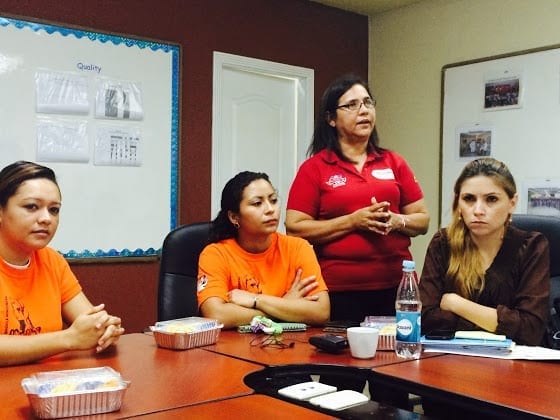
Nov 9, 2017
In Honduras, union leaders are on their way to successfully negotiating eight collective bargaining agreements covering 21,000 garment workers who have joined unions in the past few years. Contracts negotiated so far include 23 percent wage increases, free transportation to and from work, free lunch, additional severance pay for workers recovering from ergonomic-related illnesses, and educational funds for workers and their children.
Five of those agreements will be first-ever pacts for 17,350 workers, says Evangelina Argüeta Chinchilla, coordinator of organizing maquila workers in the northern Choloma region for the General Workers Central (CGT) union confederation.
Argüeta Chinchilla, whose efforts to improve factory workplaces and whose training among women garment workers is enabling them to take leading roles in their unions and communities, will be honored along with the Honduran union movement November 15 at the Solidarity Center 20th Anniversary celebration in Washington, D.C.
The evening event features AFL-CIO Secretary-Treasurer Liz Shuler and also will honor U.S. Sen. Sherrod Brown for his leadership to protect worker rights and the brave Colombian union and community activists for their frontline-efforts to achieve social justice in their country. And special guest U.S. Rep. Karen Bass will deliver remarks. (There’s still time to sponsor the event or buy tickets to attend!)
The day begins with a launch of the Solidarity Center-support book, Informal Workers and Collective Action: A Global Perspective, and panel discussions featuring U.S. Rep. Pramila Jayapal and international worker rights activists. (Find out more about the free book event and RSVP here.)
Honduran Unions ‘Persevere on Behalf of Workers and Their Families’
In a country where in recent years union leaders have been harassed, attacked and even murdered, and where employers utilize hardball tactics to prevent workers from forming unions and bargaining contracts, the stunning success of the garment workers in achieving fundamental workplace rights is a “testament to the determination of the Honduran union movement to persevere on behalf of workers and their families,” says Solidarity Center Executive Director Shawna Bader-Blau. “Together, they are helping to ensure that workers have living wages, just and fair workplaces and the opportunity to improve the future of their children.”
Argüeta Chinchilla is emblematic of these dedicated activists. She began work in a maquila at age 15, where she toiled for nine years and was a founder of the union at her factory before becoming a full-time organizer for the CGT. With Argueta’s leadership, Honduran garment-sector unions have negotiated historic worker rights agreements with two major U.S. clothing brands, Fruit of the Loom (2009) and Nike (2010), that laid the groundwork for successive organizing and collective bargaining achievements.
She and other women unionists hold leadership trainings with assistance from women’s rights organizations and the Solidarity Center. Argüeta Chinchilla hopes to see women “exercising power proportional to the numbers we represent in the world, in the labor movement.”
Empowered women now ensure their concerns are reflected in bargaining agreements. Some of the contracts garment workers have negotiated so far grant women who have just given birth additional paid leave beyond the 12-week maternity leave they receive under Honduran law.
“This is important, because a lot of times women workers must resign because they don’t have anyone to take care of their baby, especially in the early weeks, and this will help them get through that period,” says Argüeta Chinchilla, speaking through a translator.
Expanding Democracy Through the Freedom to Form Unions
International solidarity with Honduran workers has been key to furthering their efforts to achieve decent jobs. In November 2009, Russell Athletic agreed to rehire 1,200 workers in Honduras who lost their jobs when the company closed the factory in an attempt to bust the union, after the union—with support from the Solidarity Center and the United Students Against Sweatshops—convinced 110 U.S. universities to cut their apparel contracts with Russell.
Since then, says Argüeta Chinchilla, “it is very evident that significant protections have been made—workers are more educated about their rights, there is more respect for freedom of association and collective bargaining, and improvements such as health and safety for workers.
“There is always the fear of losing your job, but less now than what happened in past.”
Earlier this year, a four-year campaign by Honduran labor unions to improve workplaces and strengthen the rights of workers culminated with the Honduran National Congress approving a new labor inspection law. The law promotes, monitors and is designed to ensure that workplace standards, safety and health provisions, and social security requirements are upheld. It includes financial penalties for violations of worker rights, including the right to form unions.
Argüeta Chinchilla knows that such success begins through empowering workers, especially women workers, to take active roles in their unions.
“The internal democracy of unions has improved,” says Argüeta Chinchilla. “Many more women are active in union leadership, and this has translated into civil society: Workers are more participative in democracy and government and the country in general.”
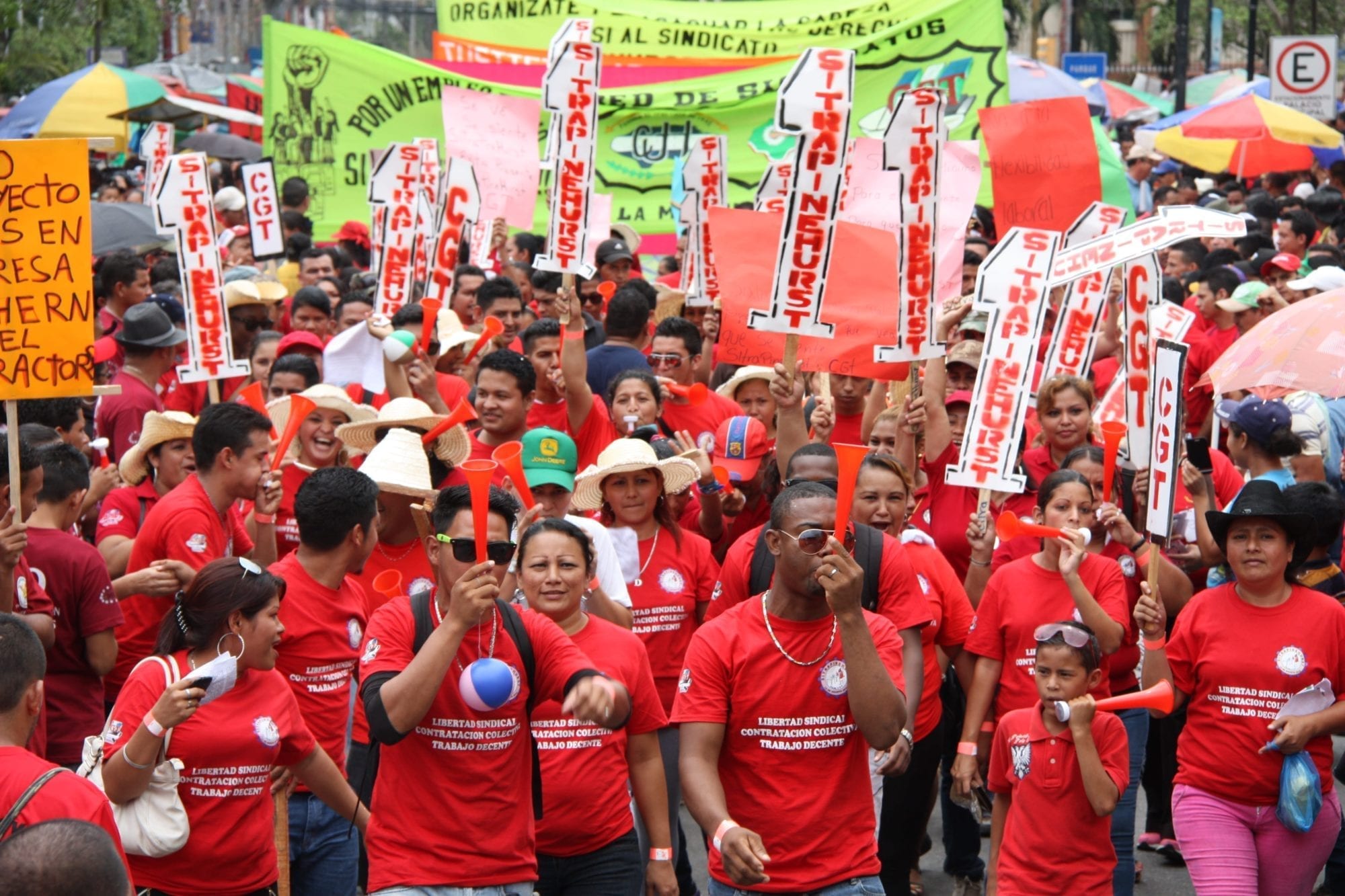
Apr 19, 2017
A brutal attack against a union leader and his brother in Honduras is the latest in escalating violence directed at worker rights activists there, according to the Honduran National Network for Violence Against Trade Unionists and other Solidarity Center partners in the country.
Moisés Sánchez, secretary general of the melon export branch of the Honduran agricultural workers’ union, Sindicato de Trabajadores de la Agroindustria y Similares (STAS), and his brother, union member Misael Sánchez, say they were attacked late last week by six men wielding machetes as they left the union office in the southern town of Choluteca, an area where agricultural workers harvest melons and other export produce.
Miseal was seriously injured after the attackers slashed his face with a machete, and Moisés was beaten for nearly an hour and told he would be murdered if he continued to assist melon workers in gaining their rights at work through the union. Misael left the hospital on Monday and is expected to survive.
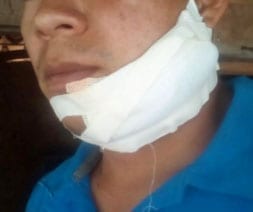
Six men attacked union member Misael Sánchez and his brother, Moisés Sánchez, a union leader, as part of a campaign targeting union activists. Credit: STAS
Honduran Government Not Protecting Targeted Union Activists
Last year, some 20 Honduran trade union activists were killed or threatened for their efforts in helping workers improve their harsh working conditions.
In recent weeks, violence or threats of violence against union activists has escalated. Isela Juárez Jiménez, president of the public employee union SITRASEMCA, says she recently suffered an attempted kidnapping. Juárez Jiménez, began receiving death threats in 2015, and her motorbike was rammed in September by a white Toyota, which had been following her for days.
Two other union leaders, Nelson Núñez of the banana and agricultural worker federation, FESTAGRO, and Miguel Angel López of the public-sector electrical workers’ union STENEE, say they recently have been followed, with López reporting a man gesturing to pull out a pistol after pulling up to his car window. Both Núñez and López received death threats last year for their organizing efforts in Honduras. Núñez’s most recent threats similarly relate to the organizing efforts in Choluteca. Patricia Riera, another FESTAGRO organizer, was the first organizer to receive death threats related to a melon worker union organizing effort in Choluteca.
Although the Inter-American Commission on Human Rights last year ordered the Honduran government to protect targeted union members, Honduras has not done so. The Network against Violence in Honduras and its sister organization in Guatemala are calling on the Honduran government to provide private security to activists who receive death threats. The networks are urging the government to investigate all murders and bring to justice the perpetrators—both those who committed the acts and those who planned them.
Workers Fired, Harassed for Seeking Union
Melon workers on plantations across the Choluteca region have long endured worker rights abuses. After they sought to improve their working conditions by forming unions in 2016 with STAS, a FESTAGRO affiliate, employers intimidated and illegally fired many workers, despite Honduran law and international conventions making it illegal to retaliate against workers for organizing unions to protect their rights on the job.
According to FESTARGO, plantation owners forced the first four union leaders to renounce the union, fired 21 union members during the spring 2016 planting season, and refused to rehire 35 unionized workers for the fall harvest. And after 47 security workers at one plantation joined the union in March, the company fired all of them.
Despite touted progress toward fulfilling the Monitoring and Action Plan developed with the U.S. government to address labor rights violations, retaliation against workers seeking unions and sustained anti-union attacks and violence persist.
The Monitoring and Action Plan was created after the AFL-CIO and 26 Honduran unions in 2012 filed a submission with the U.S. Department of Labor on the Honduran government’s failure to enforce its labor laws under the labor chapter of the Central American Free Trade Agreement (DR-CAFTA). The submission cited examples from 17 worksites spanning the manufacturing, agriculture and port sectors.
In a 2015 Public Report on the 2012 DR-CAFTA labor chapter complaint, the U.S. Office of Trade and Labor Affairs found ongoing basic labor rights violations at these same export plantations, including nonpayment of minimum wages and legally mandated benefits, wage theft, child labor and allowing children to use hazardous chemicals, and failure to provide potable water, social security enrollment and days to rest.
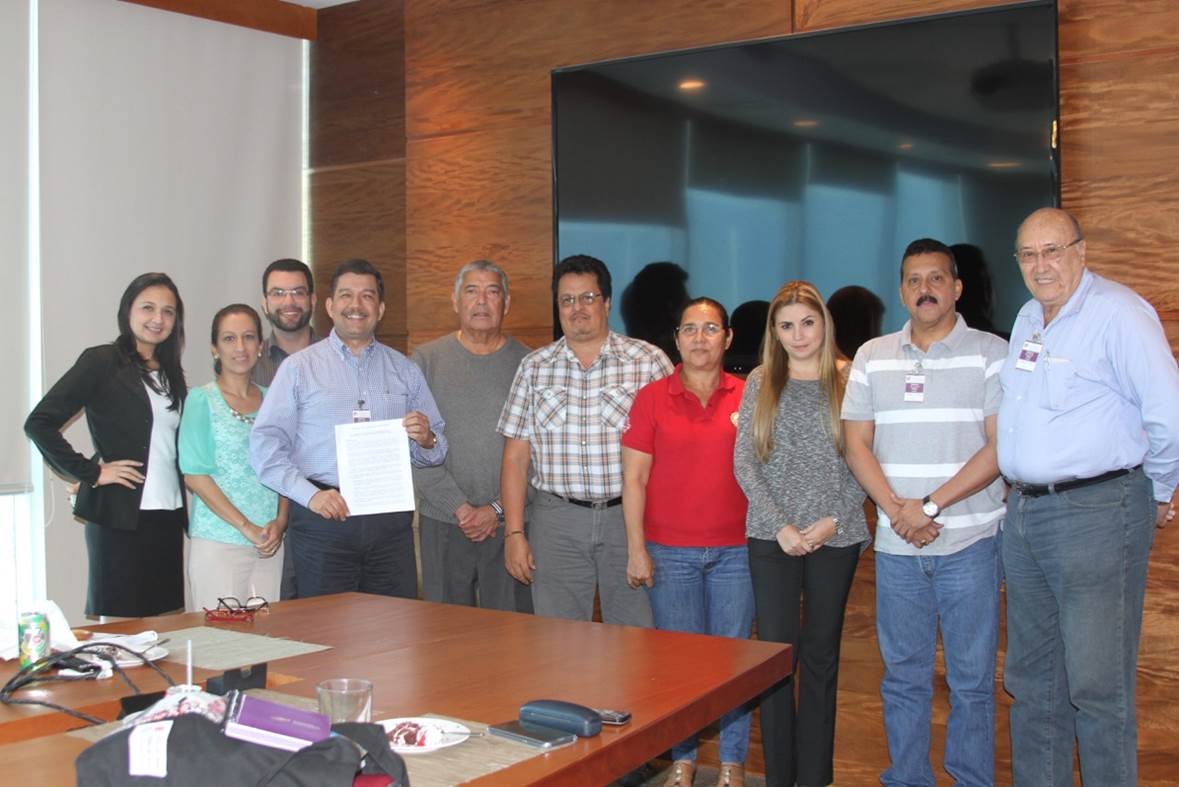
Jan 27, 2017
A four-year campaign by Honduran labor unions to improve workplaces and strengthen the rights of workers culminated with the Honduran National Congress approving a new labor inspection law last week.
Honduran unions, working in concert, successfully built a consensus with business and government to ease passage of their proposed new law. In 2015, a tripartite process (government, employers and labor unions) was initiated by the government at the urging of unions to replace the antiquated labor inspection legislation. The participating organizations were COHEP (Honduran Council of Private Enterprise), AHM (Honduran Maquila Association), Honduran Labor Ministry and the three Honduran labor centrals—General Workers Central (CGT), Confederation of Honduran Workers (CTH) and the Unified Confederation of Honduran Workers (CUTH).
The new law promotes, monitors and is designed to ensure that workplace standards, safety and health provisions and social security requirements are upheld. It includes financial penalties for violations of worker rights, including the right to form unions. Employers who threaten workers to derail the process of forming a union can be fined more than $13,000. Those who attempt to thwart a labor inspection face fines of $10,500.
Regulations regarding labor inspections and the amounts of fines for labor law violations had not been changed since passage of the Honduran Labor Code, in 1959. For decades, fines had ranged from $22 to $218. And labor inspectors had been disadvantaged by laws that protected employers over workers’ safety and rights. For example, government inspectors could not close a workplace for health and safety violations, and employers could refuse inspectors’ entry to a work site.
The Solidarity Center supported Honduran unions throughout the process, providing legal advice, analysis and other technical assistance.
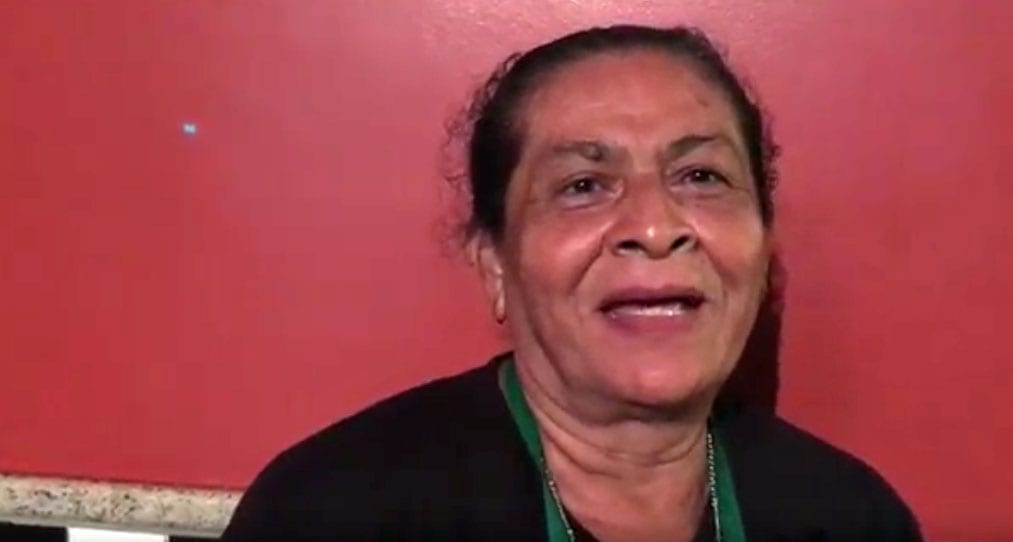
Dec 21, 2016
Esperanza Cardona, coordinator of the National Women’s Commission of La Via Campesina in Honduras, is working to end poverty through agrarian reforms and gender equality that will enable farmers to retain land rights. The organization represents two million women, 70 percent of whom live in poverty and 49 percent of whom live in extreme poverty, says Cardona.
“My name is Esperanza Cardona. I am from Honduras. I am the coordinator of the Comision Politica de Mujeres Campesinas (Policy Commission for Campesina Women). My organization is the National Women’s Commission of La Via Campesina in Honduras. It’s a mixed organization, one that fights for land rights and natural resources. We campesinos are worried about neoliberal policies that only bring us the violation of our lands and our rights, and exploitation of villages. [One such policy is] the modernization of agriculture law (approved in 1992), a law that only benefits large landholders and multinational companies … and the villages? The villages dying from hunger, poverty, malnutrition?
[In 2015], we women and our fellow campesinos, presented to the Congress a draft law on agrarian reform, food security and gender equity to replace the agriculture modernization law–which is only bringing us assassinations and discrimination. And still today, that law has yet to be considered. But we women—and the men working with us—are still fighting. And we are not going to stop confronting neoliberal policies. Latin American governments only care about money. They sell the best pasture, the best land, the best territory, and they only think about the accumulation of capital. And that’s why we women are going to keep fighting. We can’t stand any more hunger, any more poverty, any more child malnutrition, any more violations. In my country, Honduras, there’s a company that for 26 years producing corn and beans. Then one day a guy came—his name was Salvador (Savior) and expropriated their land. They brought in a lot of military. People were forcibly evicted from their land. This is the result of neoliberal policies. They are doing us great harm. This is why there is migration to the bigger cities or to countries to the north. And what do our governments do? That’s why today, I am asking women to reorganize to confront neoliberal policies. Otherwise, what are we going to do?”
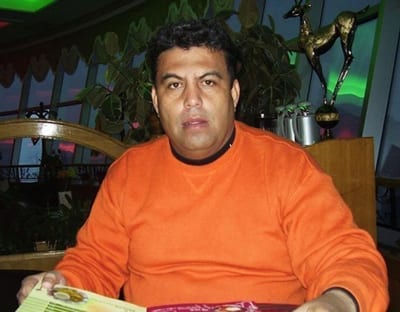
Apr 18, 2016
Since April 2015, at least 14 Honduran union leaders and members have suffered threats or violence, including one who was disappeared and another one who was murdered, part of a campaign of intimidation against worker rights documented in a new report by the Union Network against Anti-Union Violence in Honduras.
Days after the report’s release, Nelson Geovanni Núñez Chávez eceived renewed death threats for helping banana workers form unions, according to the Honduras-based nonprofit ACI-Participa. Last November, Núñez Chávez was forced to leave his home with his family after repeatedly being followed and harassed.
Nuñez Chavez is an organizer for the Honduran agricultural workers’ union, Sindicato de Trabajadores de la Agroindustria y Similares (STAS), and host of the radio program, “Unionist on the Air.”
Four of the 14 union members and leaders who were victims of violence were active in the Network against Anti-Union Violence—a trend Honduran human rights activists say is a troubling development that may indicate those who actively seek justice for perpetrators of violence are targeted for attack.
Héctor Martínez Motiño, president of a local sectional union of Workers of the National Autonomous University of Honduras (SITRAUNAH), was murdered in June despite protection from the Inter-American Commission on Human Rights (IACHR). Environmental activist Berta Cáceres Flores, who was murdered last month in Honduras, also had IACHR protection. Observers say there was no police presence around either Martínez Motiño or Cáceres when they were killed. ACI-Participa has documented the assassination of 13 recipients of precautionary measures.
Two union leaders also faced death threats as they defended worker rights at agro-industrial plantations cited in a 2012 complaint filed by the AFL-CIO and 26 Honduran unions and civil society organizations over the Central American Free Trade Agreement (CAFTA). The complaint alleges the Honduran government failed to enforce labor rights under its labor laws.
A report released yesterday by an international fact-finding commission, “Justice for Berta Cáceres Flores,” cited the “ineffectiveness of the Honduran state’s human rights protection system, as well as a prevailing institutional practice that ignores the rights of the victims of human rights violations as active rights holders.”
Honduras passed a law six months ago that protects human rights defenders, but has not issued a regulation on its implementation or enforcement.
The Network against Anti-Union Violence in Honduras, a Solidarity Center ally, was created in 2014 to document violence against union members and push for an end to impunity for those who commit such crimes. No formal statistics on violence against trade unionists existed before the network formed.







